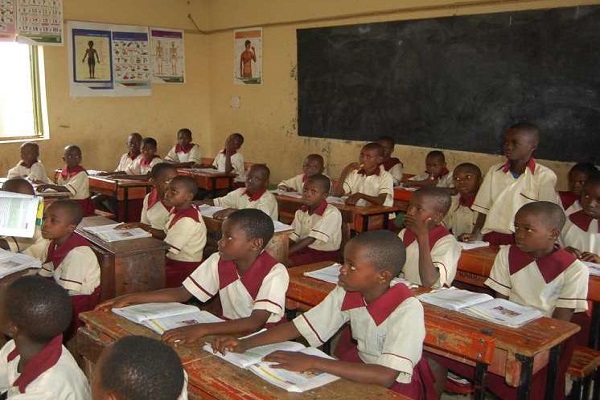The Secretary to the Enugu State Government (SSG), Prof. Chidiebere Onyia, says 50 per cent of pupils in the state can neither read in English nor solve simple mathematics questions.
Onyia stated this while delivering a keynote address titled, “Smart Basic Education and the Future of Africa” at the quadrennial convention of the Old Boys Association of Union Secondary School, Awkunanaw, on Thursday, January 4, 2024 in Enugu.
According him, the government discovered the shortcoming in its Baseline Assessment of primary schools in the state, conducted in November 2023.
“Our findings were shocking. After six years of primary school, 50 per cent of our children cannot read a single word in English and those who can read struggle with comprehension.
“50% of our children cannot solve simple subtraction challenges. What we found out in Enugu State is written large across our nation.”
Wike fumes as pupils sit on floor in Abuja school
He expressed displeasure that in Nigeria, 3 out of 4 children who completed basic education lack numeracy and literacy proficiency.
“The World Bank, UNICEF, and UNESCO have defined this as ‘the Nigerian Learning Crisis’.
“On top of this, our children suffer a “Skills Gap” because existing modes of teaching do not equip children with scientific, technological, productive, and digital competences,” Onyia added.
The SSG, however, said that the state government education policy has been repositioned to incorporate bio-digital-technology that would drive industrial growth.
This, he said, would be achieved through the introduction of innovative technologies in education, particularly at the basic education level.
He said that Gov. Peter Mbah had taken deliberate steps at reforming the education system to meet the changing global demands.
Onyia assured that the challenges were being addressed through well-thought-out radical policy-initiatives by the government.
- Bricklayer jailed 8 months for stealing 12 bags of cement - May 9, 2024
- On resignation of Ihedioha, et al from PDP - May 9, 2024
- Abuja civil servant arraigns for N135m fraud - May 9, 2024










